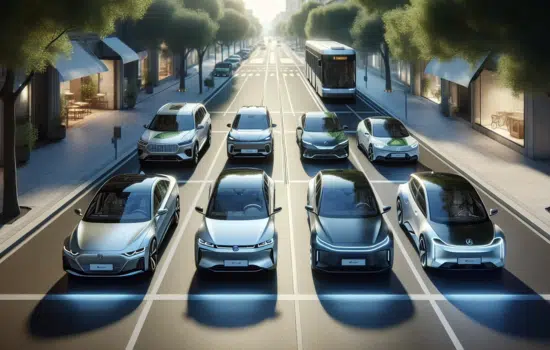Advertisements
In today's world, where sustainability and economic savings are growing priorities, choosing a vehicle that combines fuel efficiency with a low environmental impact has become a crucial decision.
In this detailed guide, we'll explore the five most fuel-efficient cars, giving you valuable information to make a smart, informed decision when purchasing your next vehicle.
Advertisements
Energy efficiency not only represents a significant saving in your monthly budget, but also contributes to the reduction of carbon emissions, promoting a cleaner and healthier planet.
Technological advances in the automotive sector have allowed the development of models that maximize fuel efficiency without sacrificing power or comfort.
Advertisements
In this context, we will highlight the key features of each of these five efficiency-leading vehicles. From their aerodynamic design to their innovations in hybrid or electric powertrains, each model offers a unique proposition for the modern driver seeking a balance between economy and ecology.
In addition, we will provide fuel economy comparisons and performance data that will allow you to evaluate which of these cars best suits your needs and lifestyle.
By opting for an eco-friendly car, you are not only investing in your financial future, but also contributing to the well-being of the planet.
See also:
- A professional masters the accordion
- Find out the sex of your baby
- Pro Saxophone: Play like a pro
- Control your baby's crying
- Excitement of being a mom instantly
Discover with us how these five cars can become perfect allies in your daily life, offering you the possibility of travelling long distances with less expense and a calmer environmental conscience.
1. Toyota Prius
The Toyota Prius has established itself as a benchmark in the field of fuel efficiency since its initial launch.
This hybrid vehicle combines a gasoline engine with an electric motor, allowing for a significant reduction in fuel consumption.
The latest generation of the Prius offers an average consumption of around 4.5 liters per 100 kilometers traveled, placing it among the most efficient cars on the market.
The Prius hybrid system not only optimizes fuel use, but also reduces emissions of polluting gases, contributing significantly to environmental protection.
In addition, the Prius features regenerative braking technology, which allows the battery to be recharged while the vehicle is in motion, thus maximizing energy efficiency.
With an aerodynamic design and advanced driver-assistance technologies, the Prius is not only efficient, but also safe and comfortable for everyday use.
2. Hyundai Ioniq
The Hyundai Ioniq is another notable contender in the fuel-efficient vehicle category.
Available in hybrid, plug-in hybrid and fully electric versions, the Ioniq offers versatility to suit the needs of different drivers.
The hybrid version, in particular, achieves an average consumption of approximately 4.3 liters per 100 kilometers, thanks to its 1.6-liter gasoline engine combined with an electric motor.
The Ioniq is designed to minimise air resistance, which contributes to its efficiency. It also incorporates advanced technologies such as intelligent energy management and adaptive cruise control, which further optimise fuel consumption.
The driving experience is complemented by a spacious interior and intuitive user interface, making the Ioniq an attractive option for those seeking economy and comfort.
3. Honda Insight
The Honda Insight, in its latest version, is presented as a hybrid option that combines efficiency with elegant style.
This sedan offers an average consumption of approximately 4.8 liters per 100 kilometers, thanks to its 1.5-liter engine and its electric motor, which work together to optimize fuel use.
The Insight stands out for its hybrid propulsion system that allows smooth transitions between the gasoline engine and the electric motor.
In addition, its interior design is designed for comfort, with high-quality materials and an advanced infotainment system.
Safety is not left behind, as the Insight includes technologies such as the collision mitigation system with braking and lane keeping assistance, making this vehicle a well-rounded option for the environmentally conscious driver.
4. Kia Niro
The Kia Niro offers an interesting proposition as a hybrid crossover that doesn't compromise on space or functionality.
With an average consumption of around 4.4 liters per 100 kilometers in its hybrid version, the Niro combines a 1.6-liter gasoline engine with an electric motor, offering efficient and dynamic driving.
This vehicle stands out for its versatility, as it combines the characteristics of an SUV with the efficiency of a hybrid.
The Niro's design is modern and attractive, with a spacious interior that comfortably accommodates five passengers.
In addition, it has a large cargo space, ideal for families or people who need to transport luggage frequently.
The Niro also incorporates advanced safety features such as blind spot detection and cross traffic alert, offering peace of mind and security on every journey.
5. Ford Fusion Hybrid
The Ford Fusion Hybrid is a sedan that combines elegance and efficiency in a single package. With a fuel consumption of around 5.5 liters per 100 kilometers, the Fusion Hybrid is positioned as an attractive option for those looking to reduce their carbon footprint without sacrificing style and comfort.
Its 2.0-liter engine, combined with an electric motor, provides a smooth and efficient driving experience.
The Fusion Hybrid's design is modern and aerodynamic, with a well-equipped interior that offers comfort and technology.
It features an intuitive infotainment system and advanced connectivity options such as Apple CarPlay and Android Auto.
In terms of safety, the Fusion Hybrid is equipped with features such as adaptive cruise control and collision warning system, ensuring safe and confident driving.
Importance of fuel efficiency
Fuel efficiency is a crucial factor when choosing a vehicle, not only because of the economic savings it represents, but also because of its environmental impact.
Fuel-efficient cars reduce CO2 emissions and other pollutants, helping to mitigate climate change and improve air quality.
Plus, as fuel prices continue to fluctuate, having a vehicle that maximizes the use of every liter translates into significant long-term savings for owners.
Advances in automotive technology have enabled the development of more efficient engines and the integration of hybrid and electric systems that optimize energy use.
These developments not only benefit the environment, but also offer drivers a smoother and more pleasant driving experience.
Future trends in eco-friendly vehicles
The future of the automotive industry is shaping up to be one of greater adoption of sustainable and eco-friendly technologies.
The trend towards electric vehicles is on the rise, with numerous manufacturers committed to expanding their range of electric models in the coming years.
Charging infrastructure is also evolving, making it easier for the general public to use electric vehicles.
In addition, innovations in batteries and powertrains are expected to continue to improve vehicle efficiency and performance, making them more accessible and attractive to consumers.
With the growing focus on sustainability, consumers are increasingly interested in transportation options that reduce their environmental impact, thus driving the development and adoption of cleaner, more efficient vehicles.
Considerations when choosing an efficient car
When selecting a fuel-efficient vehicle, it is important to consider several factors beyond simple fuel economy.
The type of technology used, whether hybrid or fully electric, can influence the decision depending on the mobility needs and charging infrastructure available in the user's area.
In addition, the size and design of the vehicle must be suitable for its intended use, ensuring that it adequately accommodates the space and comfort needs of the driver and passengers.
The initial cost of the vehicle is also a factor to consider, since, although efficient cars may have a higher price, fuel savings and possible tax incentives can offset this difference in the long term.
Finally, safety features and the manufacturer's reputation in terms of reliability and after-sales service are crucial aspects that must be evaluated to make an informed decision.
With these points in mind, consumers can select a vehicle that is not only fuel efficient, but also meets their personal needs and expectations, contributing positively to the environment and their personal finances.

Conclusion
In conclusion, opting for one of the five most fuel-efficient cars featured, such as the Toyota Prius, Hyundai Ioniq, Honda Insight, Kia Niro or Ford Fusion Hybrid, represents a smart decision from both an economic and environmental perspective.
These vehicles not only offer exceptional performance in terms of fuel efficiency, but also stand out for integrating advanced technologies that improve the driving experience and ensure safety.
For example, hybrid and electric systems allow for cleaner driving, significantly reducing CO2 emissions and contributing to the fight against climate change.
In addition, fuel savings translate into a long-term financial advantage, which is especially relevant in a context of constantly fluctuating oil prices.
On the other hand, when choosing an efficient vehicle, it is essential to consider the type of technology that best suits your mobility needs and the environment in which you move.
It is also important to evaluate the initial cost of the vehicle in relation to future savings and possible tax incentives available.
Ultimately, the transition towards more sustainable vehicles is a trend that will continue to gain momentum in the coming years, driven by the growing demand for cleaner and more efficient transport options.
By making an informed decision, you will not only be looking after your pocketbook, but also the environment, making a positive difference for the planet.




